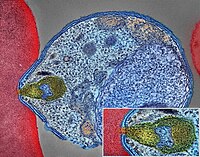
Photo from wikipedia
Malaria is an infectious disease widespread in underdeveloped tropical regions. The most severe form of infection is caused by Plasmodium falciparum, which can lead to development of cerebral malaria (CM)… Click to show full abstract
Malaria is an infectious disease widespread in underdeveloped tropical regions. The most severe form of infection is caused by Plasmodium falciparum, which can lead to development of cerebral malaria (CM) and is responsible for deaths and significant neurocognitive sequelae throughout life. In this context and considering the emergence and spread of drug-resistant P. falciparum isolates, the search for new antimalarial candidates becomes urgent. β-carbolines alkaloids are good candidates since a wide range of biological activity for these compounds has been reported. Herein, we designed 20 chemical entities and performed an in silico virtual screening against a pool of P. falciparum molecular targets, the Brazilian Malaria Molecular Targets (BRAMMT). Seven structures showed potential to interact with PfFNR, PfPK7, PfGrx1, and PfATP6, being synthesized and evaluated for in vitro antiplasmodial activity. Among them, compounds 3–6 and 10 inhibited the growth of the W2 strain at µM concentrations, with low cytotoxicity against the human cell line. In silico physicochemical and pharmacokinetic properties were found to be favorable for oral administration. The compound 10 provided the best results against CM, with important values of parasite growth inhibition on the 5th day post-infection for both curative (67.9%) and suppressive (82%) assays. Furthermore, this compound was able to elongate mice survival and protect them against the development of the experimental model of CM (>65%). Compound 10 also induced reduction of the NO level, possibly by interaction with iNOS. Therefore, this alkaloid showed promising activity for the treatment of malaria and was able to prevent the development of experimental cerebral malaria (ECM), probably by reducing NO synthesis.
Journal Title: Pathogens
Year Published: 2022
Link to full text (if available)
Share on Social Media: Sign Up to like & get
recommendations!